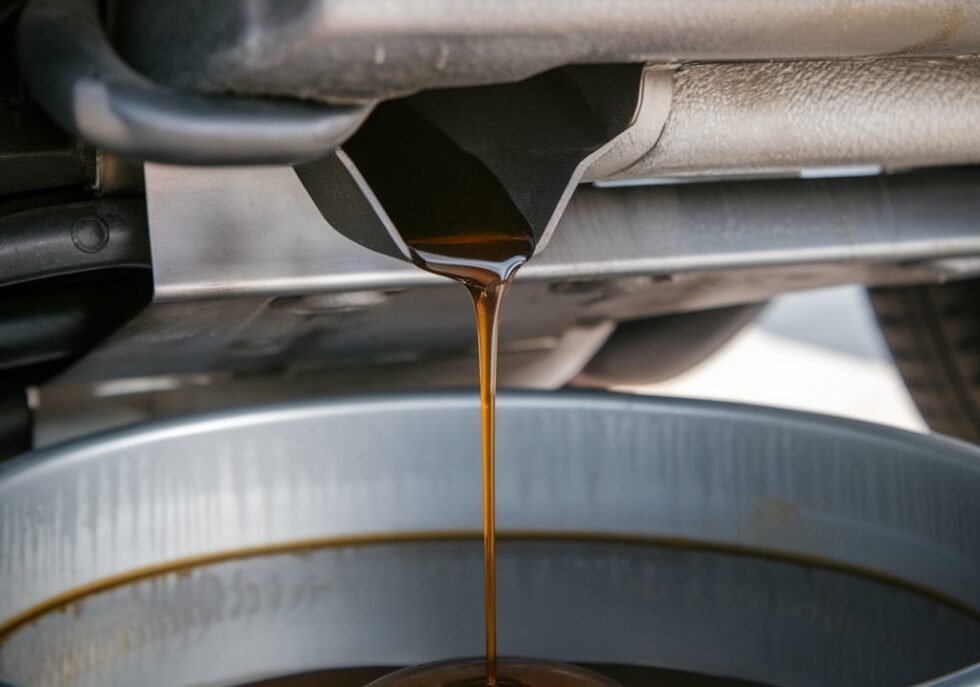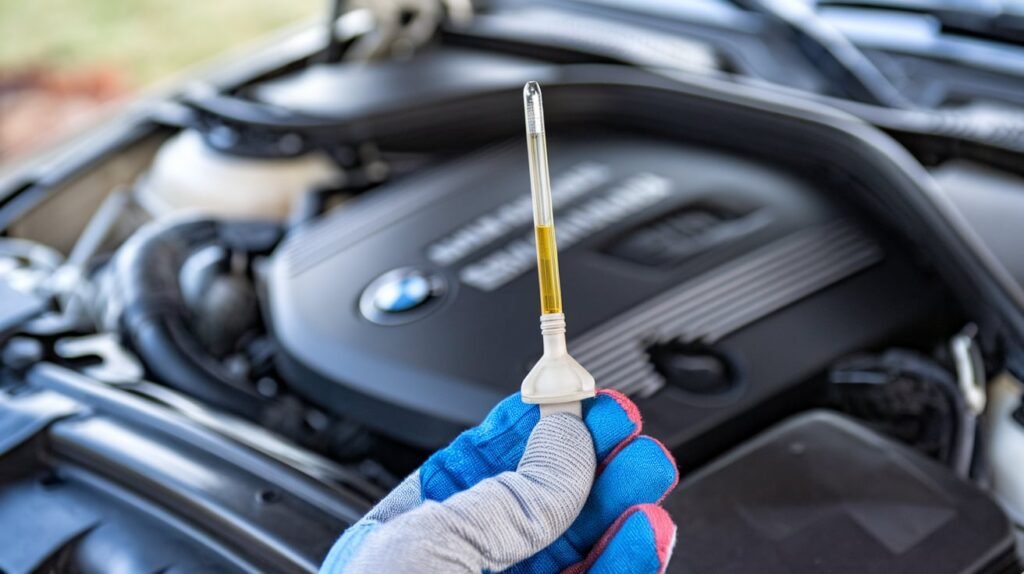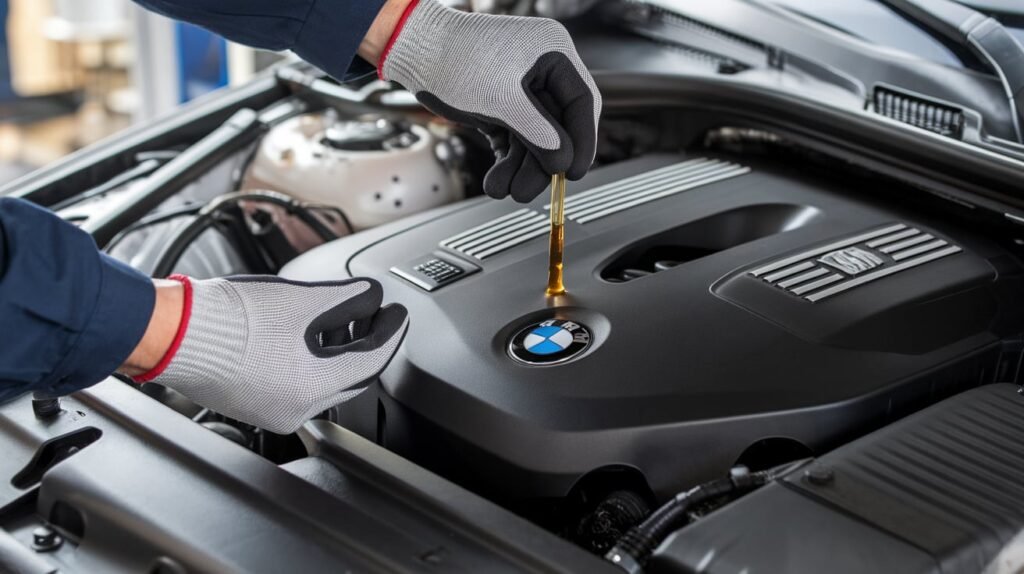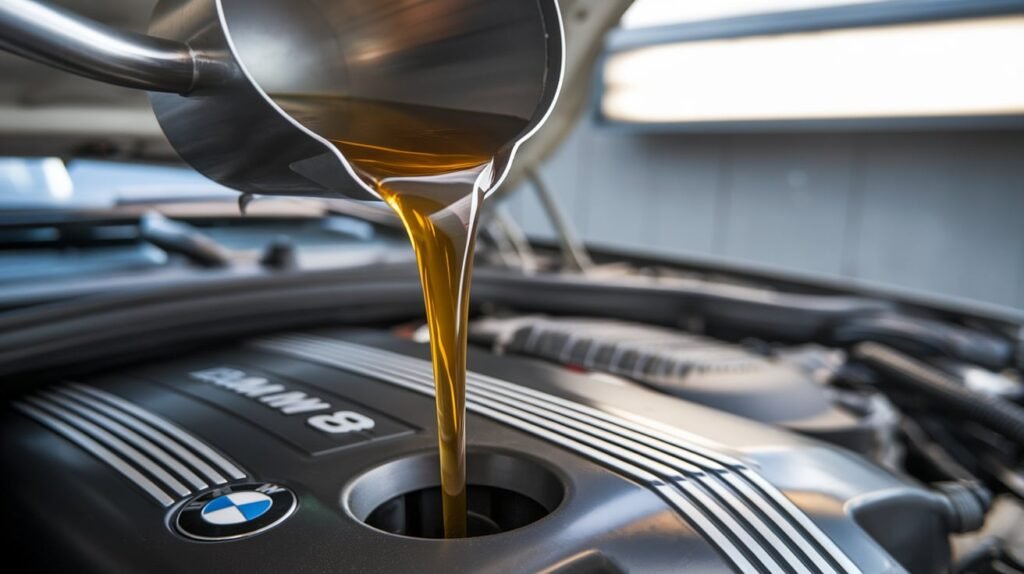
Prevent BMW Oil Leaks in UAE | Expert Tips That Work
You do not smell it at first. You do not always see it either. But when that slick stain starts appearing under your BMW, a quiet panic creeps in. Is it something minor? Or is it already eating into the engine? In Dubai’s brutal heat, BMW oil leaks are not rare; they are frequent, expensive, and incredibly sneaky. Rubber gaskets dry up faster here. Seals warp. Oil thins out quicker than it should. You might think a few drops are harmless. But what if that “small leak” is the reason your turbo is running dry?
Let us be real, a leak in a luxury engine is not the kind of surprise anyone wants. And while most BMW drivers wait until warning lights scream at them, the smarter ones? They stop leaks before they even start. In this guide, we will walk you through exactly why BMW oil leaks occur, where they originate, and how to prevent them, especially in a place like Dubai where your engine works harder than most.
Whether you own a 3 Series or an M5, this is not generic advice; it is the same inspection logic and prevention tactics used inside our garage. One valve cover gasket leak can reduce oil levels dangerously in under 500 miles, especially when driving under full AC load in the summer. So, if your BMW is more than just a status symbol, if it is your daily drive through the Jumeirah heat and Marina traffic, then protecting it from oil loss is no longer a luxury. It is a must.
Why BMW Oil Leaks Are Common in Dubai | The Real Mechanical Truth
You know that uneasy feeling when you smell something burning after parking? Or when your oil level suddenly drops even though you just topped it up? That’s not paranoia. That’s experience whispering something’s wrong. And here’s the truth, BMW oil leaks are way more common in Dubai than most owners are told. Not because the car is badly built. But because Dubai’s heat is brutal, your BMW’s engine is loaded with high-pressure systems and synthetic seals that are sensitive to stress. Let’s break it down.
- Rubber gaskets shrink and crack under prolonged heat exposure, exactly why our BMW Summer Maintenance Guide for UAE heat & roads shows how seasonal temps accelerate failures in valve covers, oil filter housing gaskets, and timing cover seals.
- Turbocharged engines run hotter, meaning more thermal expansion, which stresses the gaskets even more.
- Stop-and-go traffic in areas like Deira or Downtown keeps the engine idling long, pushing oil temperatures up while airflow stays low.
And then there’s the oil itself. Synthetic oil in high-mileage BMWs can thin out under extreme temperatures, slipping past weak seals faster than you’d expect. What makes it worse? Many garages in Dubai still overlook early symptoms. That faint oil mist near your filter housing? It’s often brushed off. But BMW engines like the N52, N54, or B58 are notorious for oil leaks once they cross 60,000 miles. If not addressed early, it snowballs.
Common BMW Models Prone to Oil Leaks
You know that sinking feeling when you spot a dark puddle under your BMW after a long drive through Dubai’s heat? It’s not just oil, it’s a warning. And if you own one of the usual suspects, you’re not alone. Some BMW models are just more prone to oil leaks than others. Not because they’re poorly built, but because certain engines and components wear faster under the UAE’s brutal climate. Let’s break it down.
BMW N52 Engine
This one’s a repeat offender. Owners of the 330i and X3 with the N52 engine often report leaks from the valve cover gasket, oil pan gasket, and oil filter housing gasket. One owner even found oil soaking the serpentine belt, forcing a crank seal replacement.
BMW Oil Leaks from this engine tend to show up after 60,000 miles, especially if the car’s parked outdoors.
BMW N20 Engine
Turbocharged and compact, but the valve cover itself is plastic, and it cracks, not just the gasket. If you’re unsure which engine you have, this Understanding BMW Engine Codes guide helps you confirm N20/N26 before ordering parts. In one case, a 328i owner replaced the gasket only to find the cover itself was leaking. The BMW N20 valve cover leak is common around 70,000 miles, and it’s particularly prevalent in high-temperature zones like Dubai.
BMW X5
Whether it’s the N52 or N63 engine, the BMW X5 oil leak saga usually starts with the oil filter housing gasket. If ignored, oil can soak the serpentine belt, wedge into the crank seal, and cause serious damage. Some workshops in Dubai report this as the most frequent oil-related repair on X5s.
BMW 3 Series
Across generations, the BMW 3 Series engine issues often trace back to the same culprits:
- Valve cover gasket
- Oil pan gasket
- Turbo oil feed lines (on N54/N55 engines)
These leaks aren’t just messy; they can trigger engine misfires or even timing chain problems if left unchecked. - If your BMW is past 50,000 miles and you’ve never had the gaskets inspected, it’s time. Dubai’s heat doesn’t wait.
Real-world case?
An X5 35i came into our garage last summer. The oil pan gasket dried and cracked. The driver kept topping up the oil, ignoring the issue. A month later, he needed a complete underbody degreasing, gasket change, and transmission mount realignment. Total downtime? 4 days. So no, BMW oil leaks are not “just part of owning a German car.” They are mechanical failures waiting to escalate, especially if you live and drive in Dubai’s conditions.

High-Risk Leak Points in BMW Engines
Have you ever popped the hood and felt like you’re staring into a maze of plastic covers and aluminum blocks? That’s a BMW engine for you—clean, tight, and deceptively fragile in the wrong conditions. Especially in Dubai, where heat doesn’t just test your patience—it tests your gaskets. Let’s talk about the usual suspects. The components that fail not because they’re poorly made, but because they’re pushed to their limits by the climate, the traffic, and the long idle times.
Valve Cover Gasket
This one’s infamous. BMW’s inline-six engines, N52, N54, N55, use plastic valve covers. Not composite. Not reinforced. Just plastic. Over time, they warp. Not always visibly, but enough to let oil seep out. One workshop in Al Quoz reported replacing five valve covers in a single week, all of which were cracked, not just the gaskets. BMW Oil Leaks from this area often drip onto the exhaust manifold, creating that burnt oil smell you can’t ignore.
Oil Filter Housing Gasket
It’s tucked between the engine block and the filter mount. Small part, big mess. When it fails, oil doesn’t just leak, it spreads. Down the block, into the belts, sometimes even into the alternator. Technicians often find this leak during routine oil changes at a BMW service center near you, but by then, it’s already made a mess across belts and the alternator.
Oil Pan Gasket
Low to the ground, exposed to heat and road debris. The oil pan gasket is rubber, and it doesn’t like thermal cycling. In Dubai, with stop-start traffic and long idle times, it gets cooked.
BMW gasket failure here can lead to slow leaks that go unnoticed until oil levels drop dangerously.
Rear Main Seal
This one’s deep. Between the engine and transmission. When it fails, it’s not just a leak, it’s a teardown. One customer paid over AED 4,000 for a rear main seal job, estimated cost. For exact pricing, contact us.
How Workshops Handle It
- Pressure testing to isolate the leak
- UV dye tracing for hidden seepage
- Replacing with original parts, not just OEM-branded ones
- Re-torquing bolts to spec, especially on valve covers and housings
- If your BMW’s past 60,000 miles and you’ve never replaced a gasket, you’re overdue. Dubai’s heat doesn’t forgive neglect.
Types of BMW Oil Leaks
You might think all oil leaks look the same. Just a dark stain on the driveway, right? But under the hood, it’s a different story. BMW engines don’t leak randomly; they leak with precision. Each type of leak tells a different story, and if you know where to look, you’ll know exactly what’s failing.
In Dubai, where engines run hotter and seals wear faster, understanding the types of BMW Oil Leaks isn’t just helpful, it’s essential. Whether it’s a slow drip from the oil pan or a misting leak from a turbo line, each one has its cause, its own risk, and its repair path.
Common Leak Types in BMW Engines:
- Valve Cover Gasket Leak
Occurs at the top of the engine. Oil may drip onto hot components, causing burning smells. - Oil Filter Housing Gasket Leak
A frequent issue in N20 and N52 engines. Leaks can spread across the engine block. - Oil Pan Gasket Leak
Located at the bottom of the engine. Often caused by road debris or heat stress. - Rear Main Seal Leak
Found between the engine and transmission. Requires major disassembly to repair. - Crankshaft Seal Leak
Appears near the front pulley. Can lead to significant oil loss if untreated. - Timing Cover Gasket Leak
Affects the engine’s timing system. Leaks here may mimic other gasket failures. - Turbocharger Oil Line Leak
Common in turbocharged BMWs. Can cause oil misting and pressure drops. - Oil Cooler Gasket Leak
Affects oil temperature regulation. Leaks may be slow but persistent. - Why This Matters:
- Each leak type has different symptoms, risks, and repair complexity.
- Identifying the exact leak source is critical for effective service.
- UAE’s climate accelerates gasket wear, making early detection essential.
What Happens If You Ignore a BMW Oil Leak? | The Consequences Are Never Small
It starts with a light shimmer on your driveway. A barely-there stain. Maybe you wipe it. Maybe you ignore it. Either way, your engine does not forget. Ignoring BMW oil leaks is like skipping sunscreen in the Dubai sun. The damage builds silently, then shows up all at once. And when it does? It is expensive, messy, and sometimes dangerous. Let’s lay out what happens when you let that oil keep leaking.
- Engine Overheating
Less oil means less cooling. Your BMW’s engine relies on oil not just for lubrication, but also for thermal regulation. Without it, metal parts grind, warp, or seize up altogether. - Premature Engine Wear
That ticking sound at startup? It might be your lifters running dry. The less oil circulating, the faster friction builds. That means your pistons, camshaft, and crankshaft are slowly eating into each other. - Oil Dripping on the Exhaust
Especially risky in turbocharged BMWs, where oil leaks onto hot exhaust manifolds. That smell of burning oil? It is not harmless. It is a potential fire hazard. - Contaminated Oxygen Sensors & Catalytic Converter Failure
Oil mist makes its way into sensors. Suddenly, you are replacing your O2 sensors or cats. That is a steep price for ignoring a drip. - Environmental Fines
In Dubai, a leaking car can lead to municipality fines if it’s found dripping oil in public parking spots. We have seen it happen.
We had a client with an E90 325i, valve cover leak ignored for 2 months. The oil caught fire at a traffic signal in Business Bay. Luckily, it was caught in time, but the cleanup and repairs ran over 8,000 AED. So if you think a BMW oil leak is “just a little mess,” think again. You are not just risking your engine, you are gambling with fire, penalties, and repair bills that grow with every mile.
How to Prevent BMW Oil Leaks in Dubai | Smart Maintenance That Works
You do not wait for a nosebleed to hydrate, right? Then why wait for a puddle to appear before checking your BMW’s oil system? In Dubai, heat is not just intense, it is relentless. And over time, that punishes seals, gaskets, and fluid quality. That is exactly why BMW oil leaks creep in silently, not always because something broke, but because routine maintenance was delayed just a little too long. So how do you stop a leak before it starts? Here’s what we follow, and what we recommend to every BMW owner who visits our garage:
✅ Stick to 5,000–6,000 Mile Oil Change Intervals
Yes, even with synthetic oil. Dubai’s stop-start traffic and high-speed highway bursts accelerate oil breakdown. By 6,000 miles, it starts thinning out, putting pressure on your gaskets.
✅ Replace Gaskets as a Preventive — Not a Reaction
Most BMW oil leaks come from valve cover, oil filter housing, and oil pan gaskets. These often fail around 60,000 to 70,000 miles, especially in models like the F10, G30, or older E-series. Changing them early saves you from engine bay contamination and labor-heavy repairs later.
✅ Summer-Specific Prechecks Matter
Before May kicks in, do a full gasket inspection. Heat expansion does not just affect the engine — it causes microscopic gasket gaps that worsen into leaks once oil pressure kicks in.
✅ Monitor Oil Pressure Sensors & Oil Levels Monthly
A slightly off reading on the oil level sensor? That’s not nothing. It is the first clue in the oil leak trail. We have seen this in dozens of N52/N54 engines long before external leaks showed up.
Fact: A worn oil filter housing gasket can cause invisible seepage for months, damaging belts and electrical components below before it ever reaches the ground.
✅ Avoid Overfilling at Top-Ups
Yes, overfilling causes leaks too. The oil finds pressure release through weak points, especially crankshaft seals. Always check dipsticks carefully; do not eyeball them.

Real BMW Oil Leak Cases from Dubai Roads | Mistakes to Learn From
Sometimes it takes more than a warning light to realize your BMW is trying to tell you something. And in Dubai, where engines run hot and long, small oversights can spiral fast. Over the past few years, we have seen leaks that barely made a stain, but nearly cost someone an engine. These stories are not rare. They’re lessons. If you drive a BMW here, these might hit closer to home than you expect.
🧱 The “No Drip” Illusion – BMW X5 35i
The owner swore he saw nothing on his driveway. But every time he hit the highway, a faint oil smell crept in through the vents. Turns out, oil was seeping slowly from the filter housing gasket and dripping straight onto the serpentine belt. No puddles, no visible stains. But over time, it soaked into components no one wants oil on. Moral of the story? Just because you do not see a leak does not mean your engine is not bleeding.
🔥 The Spark Plug Surprise – BMW 328i F30
Everything was running smoothly… until the AC was on, and traffic got thick. Suddenly, the idle got rough. Turns out, the valve cover gasket was leaking internally. Oil had found its way into the spark plug wells, and two ignition coils were already fouled. This one was caught early, but if left longer? That same oil could’ve shorted more electronics, leading to serious driveability issues.
⚠️ The “Oil Light Blinks But It’s Fine” Trap – BMW M5 F10
Yes, the car still drove. And no, there was no smoke, yet. But that blinking oil light was not lying. What was underneath? A fully degraded oil pan gasket, dripping oil onto the exhaust. At highway temps, that’s flirting with disaster. The car made it back to the garage, barely. But the smell? Burnt oil and cooked wiring. A few more days, and this could’ve gone viral… for the wrong reason. Lesson: That burnt smell under the hood? It is never just ‘dust.’ Always listen to it.
Everyone thinks it will not happen to them, until it does. These are not horror stories. They are warnings with a chance to act earlier next time. Because when it comes to BMW oil leaks, ignorance costs more than repairs ever will. Book expert help before a small seep becomes a major leak. Get a same-day inspection at our BMW garage in Dubai, handled by a certified BMW workshop team inside a full BMW service center Dubai, from UV dye leak tracing to OEM gasket replacement.

BMW Oil Leak Repair Costs in Dubai
Let’s be honest, BMW Oil Leaks are more than just a nuisance. They’re a financial wildcard. One day it’s a small drip, the next it’s a full-blown engine teardown. And in Dubai, where heat accelerates wear, the repair costs can swing wildly depending on what’s leaking and how long it’s been ignored. Here’s what you’re looking at, based on real workshop data:
Estimated Repair Costs by Component
(Estimation cost, for exact pricing, contact us)
- Valve Cover Gasket Replacement
AED 850 – AED 1,400
Includes labor, gasket, and re-torque.
Often needed on N52 and N20 engines after 60,000 miles. - Oil Filter Housing Gasket
AED 600 – AED 950
Quick job, but messy if ignored.
Can contaminate belts and the alternator if left untreated. - Oil Pan Gasket
AED 1,200 – AED 1,800
Requires engine support and full pan removal.
Common on X5 and 5-Series models. - Rear Main Seal
AED 3,500 – AED 4,800
Major labor. Transmission removal required.
Often bundled with clutch or flywheel service. - Turbo Oil Line Leak
AED 950 – AED 1,600
Includes line replacement and heat shielding.
Seen in N54/N55 turbocharged engines.
Idea: If you’re already doing a major service, ask your technician to inspect all gaskets. Catching a leak early can save thousands.
What Affects Pricing?
- Engine type and layout
- Access difficulty (some leaks are buried deep)
- Use of original parts vs aftermarket or OEM-branded
- Mileage and previous service history
Always ask for a full diagnostic before approving repairs. A leak in one area often means stress elsewhere.
Best Practices to Prevent BMW Oil Leaks in UAE | What Smart Drivers Do
You do not wait for smoke to check your brakes, right? So why wait for oil to hit the floor before protecting your engine? In the UAE, especially Dubai, BMW oil leaks are not a matter of “if.” They are a matter of “when… unless you act early.” Prevention here is not about doing more work. It is about doing the right work, at the right time. Here’s what works, from real garage experience:
Inspect Common Leak Points Every 10,000 Miles
Valve cover gasket, oil filter housing, and oil pan; these are the usual suspects. Have them checked routinely, especially before long drives.
Stick to Shorter Oil Change Intervals
Yes, synthetic oils are great. But not invincible. In Dubai heat? 5,000 to 6,000 miles is your safest window, especially with turbo models like the 535i or M-series.
Watch for Oil Level Drops — Even Without a Leak
Some BMW oil leaks do not drip. They seep. Into components. Onto belts. Into spark plug wells. That slow oil level drop? Often your only early clue.
Avoid Mixing Oil Brands or Grades
A mix of viscosities can destabilize oil behavior under heat. Stick to what your engine is tuned for, ideally 5W-30 or 0W-40 for most UAE BMWs.
Let the Engine Cool Before Checking or Topping Up
Overfilling or checking too soon after shutdown? Classic mistake. Expanding oil gives you a false reading, leading to overfills and pressure leaks.
In short, BMW oil leaks are preventable. But only if you stop chasing problems, and start building habits that keep them from happening in the first place.
What You Do Today Saves Your Engine Tomorrow?
Let’s be honest, no one ever plans for an oil leak. It just shows up. Quiet at first. A smell, a smudge, a low reading. But in Dubai, where engines are already under stress, even a minor leak can snowball fast. And here’s the truth most garages will not tell you: BMW oil leaks are not always your fault. They happen because of heat, age, and pressure. But catching them? That part is on you. If you take away anything from this blog, let it be this:
- Do not wait for the warning light.
- Do not assume a dry garage floor means your engine is fine.
- And never, ever think one oil top-up can replace an actual fix.
Fact: In our region, most BMW engine failures that start with oil loss could have been prevented with a simple inspection… weeks earlier.
So, what now? Start with awareness. Look under the hood. Ask questions. Book a BMW oil system check before summer peaks or after 60,000 miles. It is not paranoia, it is self-preservation. And if you are not sure what’s going on under your valve cover or filter housing? Just ask. We would rather hear your questions now… than your engine later.

